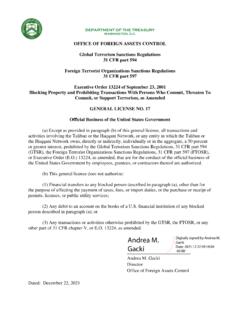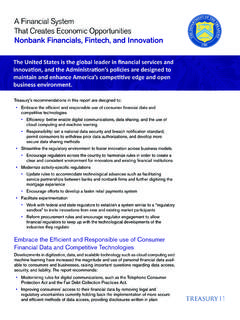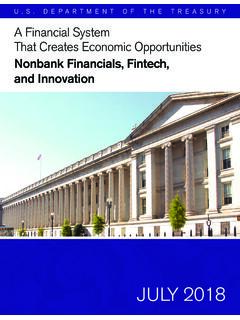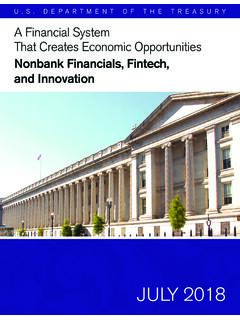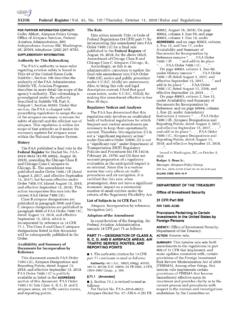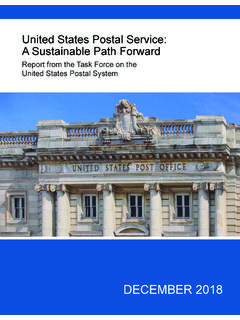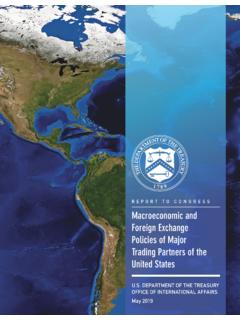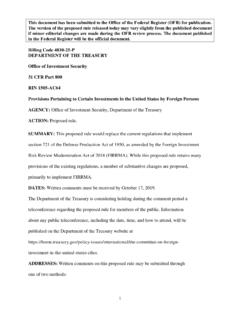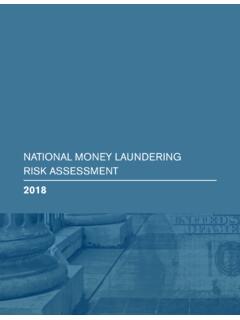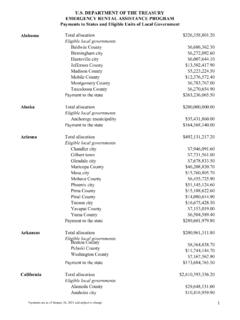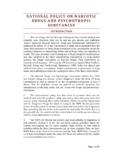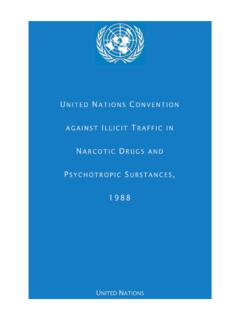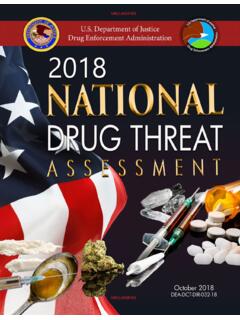Transcription of CONTENTS
1 CONTENTSI ntroduction ..1 What Is OFAC? ..2 What Are OFAC Sanctions? ..3 The SDN List ..4 How Do You Block Virtual Currency? ..5 Case Study: OFAC Sanctions Involving Virtual Currency ..5 Who Must Comply with OFAC Sanctions? ..6 Strict Liability Regulations ..6 OFAC Requirements and Procedures ..7 Reporting Requirements ..7 Recordkeeping Requirements ..8 License Procedures ..8 Consequences of Noncompliance ..9 Enforcement Enforcement Guidelines ..9 Enforcement Actions ..9 Voluntary Self-Disclosure ..9 Sanctions Compliance Best Practices for the Virtual Currency Industry ..10 Management Commitment ..11 Risk Assessment ..12 Case Study: Diagnosing Risky Relationships ..12 Internal Case Study: Double-Duty Data ..13 Sanctions Screening.
2 16 Remediating the Root Causes of Violations ..17 Risk Indicators ..17 Testing and Auditing ..18 Training ..19 OFAC Resources ..20 FAQs on Virtual Currency Topics ..20 Contact Information ..21 Resource Sites ..22 Sanctions Compliance Guidance for the Virtual Currency Industry Department of the Treasury | OFAC 1 INTRODUCTIONV irtual currencies are beginning to play an increasingly prominent role in the global economy. The growing prevalence of virtual currency as a payment method likewise brings greater exposure to sanctions risks like the risk that a sanctioned person or a person in a jurisdiction subject to sanctions might be involved in a virtual currency transaction. Accordingly, the virtual currency industry, including technology companies, exchangers, administrators, miners, wallet providers, and users, plays an increasingly critical role in preventing sanctioned persons from exploiting virtual currencies to evade sanctions and undermine foreign policy and national security interests.
3 The Department of the Treasury s Office of Foreign Assets control (OFAC) is issuing this guidance to assist the virtual currency industry in mitigating these sanctions compliance obligations apply equally to transactions involving virtual currencies and those involving traditional fiat currencies. Members of the virtual currency industry are responsible for ensuring that they do not engage, directly or indirectly, in transactions prohibited by OFAC sanctions, such as dealings with blocked persons or property, or engaging in prohibited trade- or investment-related transactions. This guidance will assist those in the virtual currency industry in: Evaluating sanctions-related risks in their lines of business Building a risk-based sanctions compliance program Protecting their business from sanctions violations and intentional misuse of virtual currencies by malicious actors Understanding OFAC s recordkeeping, reporting, licensing, and enforcement processesOFAC is committed to engaging with the virtual currency industry to promote understanding of, and compliance with, sanctions requirements and due diligence best | Department of the Treasury Sanctions Compliance Guidance for the Virtual Currency IndustryThe Office of Foreign Assets control (OFAC)
4 Is the office within the Department of the Treasury that is responsible for administering and enforcing economic sanctions against targeted foreign countries, geographic regions, entities, and individuals to further foreign policy and national security goals. Economic sanctions are used by the government to prevent targets such as terrorists, international narcotics traffickers, weapons of mass destruction proliferators, and perpetrators of serious human rights abuse from accessing the financial system for purposes contrary to foreign policy and national security interests, and to change the behavior of such targets. In this way, among others, economic sanctions can be a powerful foreign policy tool, but the effectiveness of sanctions relies upon the active participation of everyone subject to jurisdiction, including those within the virtual currency industry.
5 What is OFAC? Sanctions Compliance Guidance for the Virtual Currency Industry Department of the Treasury | OFAC 3 OFAC administers over 35 different sanctions programs each designed to respond to specific threats and to further foreign policy and national security goals. As a result, the types of sanctions employed in each program may differ. Generally, OFAC sanctions can be either comprehensive or targeted in nature and can require the blocking of assets or impose restrictions on financial or trade-related activities with a specific person, country, region, or government. The most comprehensive sanctions programs that OFAC administers typically include several or all of the following types of sanctions, while other sanctions programs may only employ some of these options: In its administration of list-based sanctions, OFAC maintains several public lists of individuals and entities and their identified blocked property, such as aircraft and vessels, targeted by OFAC sanctions.
6 The most prominent among these is the Specially Designated Nationals What are OFAC Sanctions?Broad trade-based sanctions or embargoes prohibit dealings with an entire country or geographic region, unless exempt or authorized. This type of sanction usually includes a prohibition on importing or exporting goods or services to or from the sanctioned jurisdiction. Such sanctioned jurisdictions currently include Cuba, Iran, North Korea, Syria, and the Crimea region of or regime sanctions either (1) require the blocking of all property and interests in property of a particular foreign government or regime that are or come within the United States or the possession or control of a person, or (2) prohibit specific types of transactions and activities involving a particular foreign government or sanctions target specific, listed individuals and entities and either (1) require the blocking of all property and interests in property of those listed persons that are or come within the United States or the possession or control of a person, or (2)
7 Prohibit specific types of transactions and activities with listed sanctionstarget individuals and entities operating in specific sectors of a foreign country s economy or prohibit specific activities associated with a sector of a foreign country s | Department of the Treasury Sanctions Compliance Guidance for the Virtual Currency Industryand Blocked Persons List, known as the SDN List. Both the SDN List and the Consolidated Sanctions List a list that combines all other sanctions lists maintained by OFAC are available for public use in a number of different data formats and data schemas. To make it easier to screen and use OFAC s sanctions lists for compliance purposes, OFAC has a free search tool, the Sanctions List Search, which can conduct searches across all of the sanctions lists administered by explained in OFAC s 50 Percent Rule, OFAC s sanctions lists do not separately list the names of all entities owned 50 percent or more by blocked persons, or the countries, regions, or governments subject to more comprehensive sanctions.
8 OFAC s sanctions programs are dynamic, so prior due diligence on the parties and locations with which you plan to do business is essential. For more program-specific sanctions information, please visit OFAC s Sanctions Programs and Country Information webpage. The SDN ListOFAC s Specially Designated Nationals and Blocked Persons List (the SDN List ) is one of the lists of sanctioned persons that OFAC publishes as part of its enforcement efforts.* The SDN List includes certain individuals and entities sanctioned due to their nexus to a targeted country, geographic region, or regime. The SDN List also includes individuals, groups, and entities, such as terrorists, narcotics traffickers, and human rights abusers designated under sanctions programs that are not jurisdiction specific. Collectively, designated individuals and entities are called Specially Designated Nationals and blocked persons or SDNs.
9 As of the date of publication, OFAC s SDN List contains over 9,000 names (or variations thereof) of designated individuals and entities located around the world, as well as identifications of certain property blocked by sanctions such as vessels and aircraft. The SDN List is frequently updated, and you can sign up to receive email notifications whenever OFAC updates its SDN , pursuant to OFAC s 50 Percent Rule, any entity owned, directly or indirectly, 50 percent or more, individually or in the aggregate by one or more blocked persons, is also considered a blocked person even if that entity does not itself appear on the SDN List and the same restrictions apply. (See Revised Guidance on Entities Owned by Persons Whose Property and Interests in Property Are Blocked, August 13, 2014.) In general, unless exempt or authorized by OFAC, persons are prohibited from engaging in transactions with SDNs or blocked persons, directly or indirectly, and must block any property in their possession or control in which an SDN or a blocked person has an interest.
10 * To learn more about other sanctions lists maintained by OFAC, visit OFAC s Other OFAC Sanctions Lists webpage. Sanctions Compliance Guidance for the Virtual Currency Industry Department of the Treasury | OFAC 5 OFAC Sanctions Involving Virtual CurrencyIn recent years, OFAC sanctions have increasingly targeted individuals and entities that have used virtual currency in connection with malign activity. For example, on March 2, 2020, OFAC sanctioned two Chinese nationals involved in a North Korean state-sponsored money-laundering scheme. The individuals received approximately $100 million in virtual currency stolen from cyber intrusions against two virtual currency exchanges and began layering the funds in complex transactions to include purchasing over $1 million in digital music gift cards.
